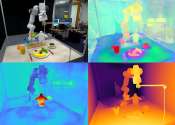In philosophy, psychology, and the cognitive sciences, perception is the process of attaining awareness or understanding of sensory information. It is a task far more complex than was imagined in the 1950s and 1960s, when it was predicted that building perceiving machines would take about a decade, a goal which is still very far from fruition. The word comes from the Latin words perceptio, percipio, and means "receiving, collecting, action of taking possession, apprehension with the mind or senses."
Perception is one of the oldest fields in psychology. The oldest quantitative law in psychology is the Weber-Fechner law, which quantifies the relationship between the intensity of physical stimuli and their perceptual effects. The study of perception gave rise to the Gestalt school of psychology, with its emphasis on holistic approach.
What one perceives is a result of interplays between past experiences, including one’s culture, and the interpretation of the perceived. If the percept does not have support in any of these perceptual bases it is unlikely to rise above perceptual threshold.









